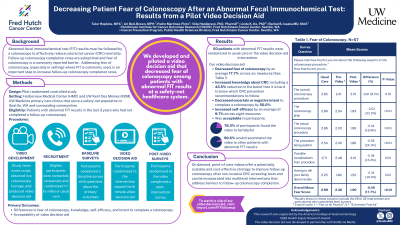Tuesday Poster Session
Category: Colorectal Cancer Prevention
P3860 - Decreasing Patient Fear of Colonoscopy After an Abnormal Fecal Immunochemical Test: Results from a Pilot Video Decision Aid
Tuesday, October 29, 2024
10:30 AM - 4:00 PM ET
Location: Exhibit Hall E

Has Audio

Talor Hopkins, MPA
Hutchinson Institute for Cancer Outcomes Research, Fred Hutchinson Cancer Center
Seattle, WA
Presenting Author(s)
Talor Hopkins, MPA1, Ari Bell-Brown, MPH1, Pedro Martinez-Pinto, 2, Vida Henderson, PhD, PharmD2, Linda K.. Ko, PhD2, Rachel B.. Issaka, MD, MAS1
1Hutchinson Institute for Cancer Outcomes Research, Fred Hutchinson Cancer Center, Seattle, WA; 2Fred Hutchinson Cancer Center, Seattle, WA
Introduction: Abnormal fecal immunochemical test (FIT) results must be followed by a colonoscopy to effectively reduce colorectal cancer (CRC)-mortality. In most healthcare settings, follow-up colonoscopy rarely exceeds 50%. We and others have identified fear of colonoscopy as an important barrier to address, especially in safety-net systems, where FIT is commonly used. Therefore, we developed and piloted a video decision aid aimed to address fear of colonoscopy among patients with abnormal FIT results at Harborview Medical Center (HMC), a large, urban, safety-net healthcare system.
Methods: In partnership with advisors, we finalized a script, obtained live colonoscopy footage from a consented patient, and produced a video to facilitate patient decision-making regarding colonoscopy completion. HMC patients with an abnormal FIT result in the past 3 years who had not completed a colonoscopy were randomized 1:1 to the video or usual care per their primary care provider. All participants completed a baseline survey for demographic information and to assess fear (e.g., pain from procedure, prep, CRC), knowledge about CRC, self-efficacy and intent to complete a colonoscopy. Participants randomized to the video (intervention) completed a post-intervention survey for similar measures and an acceptability questionnaire.
Results: Between May 2023 and May 2024, 60 eligible patients were randomized to the intervention or usual care (Table 1). Post-intervention, participants reported a 13.3% overall decrease in fear of colonoscopy across all measures, including a 20.7% decrease in fear of a colonoscopy being painful, a 17.3% decrease in fear of the bowel prep, and a 50.0% decrease in uncertain or negative intent to complete a colonoscopy. Compared to usual care, fewer participants randomized to the intervention reported that CRC must cause pain before diagnosis (35.7% vs. 15.6%, p=0.04). Overall, 78.3% of participants found the video to be helpful and 90.6% would recommend the video to other patients with abnormal FIT results.
Discussion: Our video decision aid decreased fear of colonoscopy, increased knowledge about CRC (e.g., CRC can occur without pain) and intent to complete a colonoscopy in a population with abnormal FIT results. On demand, point-of-care videos offer a potentially scalable and cost-effective strategy to improve follow-up colonoscopy after non-invasive CRC screening tests and can be incorporated into multilevel interventions to address this issue.
Note: The table for this abstract can be viewed in the ePoster Gallery section of the ACG 2024 ePoster Site or in The American Journal of Gastroenterology's abstract supplement issue, both of which will be available starting October 27, 2024.
Disclosures:
Talor Hopkins, MPA1, Ari Bell-Brown, MPH1, Pedro Martinez-Pinto, 2, Vida Henderson, PhD, PharmD2, Linda K.. Ko, PhD2, Rachel B.. Issaka, MD, MAS1. P3860 - Decreasing Patient Fear of Colonoscopy After an Abnormal Fecal Immunochemical Test: Results from a Pilot Video Decision Aid, ACG 2024 Annual Scientific Meeting Abstracts. Philadelphia, PA: American College of Gastroenterology.
1Hutchinson Institute for Cancer Outcomes Research, Fred Hutchinson Cancer Center, Seattle, WA; 2Fred Hutchinson Cancer Center, Seattle, WA
Introduction: Abnormal fecal immunochemical test (FIT) results must be followed by a colonoscopy to effectively reduce colorectal cancer (CRC)-mortality. In most healthcare settings, follow-up colonoscopy rarely exceeds 50%. We and others have identified fear of colonoscopy as an important barrier to address, especially in safety-net systems, where FIT is commonly used. Therefore, we developed and piloted a video decision aid aimed to address fear of colonoscopy among patients with abnormal FIT results at Harborview Medical Center (HMC), a large, urban, safety-net healthcare system.
Methods: In partnership with advisors, we finalized a script, obtained live colonoscopy footage from a consented patient, and produced a video to facilitate patient decision-making regarding colonoscopy completion. HMC patients with an abnormal FIT result in the past 3 years who had not completed a colonoscopy were randomized 1:1 to the video or usual care per their primary care provider. All participants completed a baseline survey for demographic information and to assess fear (e.g., pain from procedure, prep, CRC), knowledge about CRC, self-efficacy and intent to complete a colonoscopy. Participants randomized to the video (intervention) completed a post-intervention survey for similar measures and an acceptability questionnaire.
Results: Between May 2023 and May 2024, 60 eligible patients were randomized to the intervention or usual care (Table 1). Post-intervention, participants reported a 13.3% overall decrease in fear of colonoscopy across all measures, including a 20.7% decrease in fear of a colonoscopy being painful, a 17.3% decrease in fear of the bowel prep, and a 50.0% decrease in uncertain or negative intent to complete a colonoscopy. Compared to usual care, fewer participants randomized to the intervention reported that CRC must cause pain before diagnosis (35.7% vs. 15.6%, p=0.04). Overall, 78.3% of participants found the video to be helpful and 90.6% would recommend the video to other patients with abnormal FIT results.
Discussion: Our video decision aid decreased fear of colonoscopy, increased knowledge about CRC (e.g., CRC can occur without pain) and intent to complete a colonoscopy in a population with abnormal FIT results. On demand, point-of-care videos offer a potentially scalable and cost-effective strategy to improve follow-up colonoscopy after non-invasive CRC screening tests and can be incorporated into multilevel interventions to address this issue.
Note: The table for this abstract can be viewed in the ePoster Gallery section of the ACG 2024 ePoster Site or in The American Journal of Gastroenterology's abstract supplement issue, both of which will be available starting October 27, 2024.
Disclosures:
Talor Hopkins indicated no relevant financial relationships.
Ari Bell-Brown indicated no relevant financial relationships.
Pedro Martinez-Pinto indicated no relevant financial relationships.
Vida Henderson indicated no relevant financial relationships.
Linda Ko indicated no relevant financial relationships.
Rachel Issaka: Guardant Health, Inc. – Advisory Committee/Board Member.
Talor Hopkins, MPA1, Ari Bell-Brown, MPH1, Pedro Martinez-Pinto, 2, Vida Henderson, PhD, PharmD2, Linda K.. Ko, PhD2, Rachel B.. Issaka, MD, MAS1. P3860 - Decreasing Patient Fear of Colonoscopy After an Abnormal Fecal Immunochemical Test: Results from a Pilot Video Decision Aid, ACG 2024 Annual Scientific Meeting Abstracts. Philadelphia, PA: American College of Gastroenterology.
